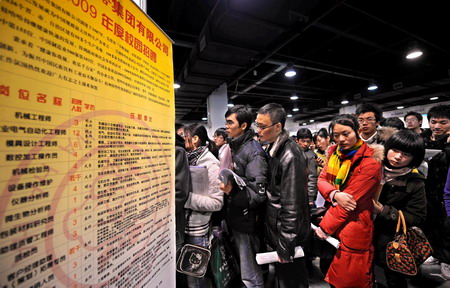Crisis of smaller firms means gloom for jobs
Chen Zao has never seriously considered working for a private company. But uncertainty about the future, led her to leave a resume with Huaqi, a well known IT firm with annual sales of over 2 billion yuan.
In her resume, Chen Zao said she was looking for a job as a "trainee manager", but actually, there were no other choices. Huaqi is planning to fill only 40 posts this year, all of them trainee managers. By comparison, in 2007, the company had advertised more than a 100 vacancies in diverse positions including sales representatives, hardware specialists and software engineers. In November 2008, it was rumored that Huaqi was planning to cut staff, but the company would not confirm the reports.
As the global financial crisis unfolds, most private companies are either cutting staff or freezing recruitment. Small and medium-sized enterprises have been collapsing one after another in the Pearl River Delta. According to government figures, since January 2008, more than 60,000 enterprises have gone out of business in Guangdong Province. Although the companies affected may not have been a college graduate's ideal employer, the bleak economic picture and widespread collapse of firms is badly affecting the morale of all job-seekers.
 |
|
College graduates line up in front of a booth at a job fair to get an possible interview chance at Hangzhou Peace International Convention and Exhibition Center in Hangzhou, east China's Zhejiang province January 13, 2009.
|
On a jobs website for college graduates, Chen Zao read that apart from online games developers, almost all businesses were cutting back on recruitment. In 2007, stock brokers and financial companies were popular choices for job-seekers, but this year, it was hard to find any of them on the website.
A friend of Chen Zao joined a fund management firm in 2008 after graduating from the School of Finance of Renmin University. He said it would have been "a nightmare" if he had graduated this year. With banks, insurance companies and fund management firms downsizing, "who on earth is going to hire new staff?"
December 16, Huaqi invited Chen Zao to a screening interview, in which about 80 percent of the candidates would be eliminated. The interview was simple, lasting only 10 minutes. Chen Zao was asked to introduce herself and answer a couple of questions.
A week later, Chen Zao had received no news from Huaqi, but she was not disappointed, because she had never wanted to work for a private company, especially a relatively small company such as Huaqi.
But private companies are major employers of college graduates. More than half of the graduates from Chen Zao's course have historically found jobs in the private sector. Many are engaged in legal consultancy services and some have even switched to other professions like sales and management.
The experience of one of Chen Zao's cousins had a profound impact on her. In 1999, the year he graduated from college, China changed its employment policy regarding college students. Previously, China had followed a policy under which the government imposed quotas on college enrolment and was responsible for the employment of graduates. But the practice began to change in the 1990s. Colleges and employers were allowed to meet directly to discuss job issues, and the government relinquished its responsibility for placing students in jobs.
Chen Zao's cousin majored in communications engineering at Xiamen University. In 1999, he joined Huawei Technologies Co., Ltd. at a job fair organized by his school. He still works there but recently narrowly escaped being culled in massive staff cuts; his narrow escape left a deep impression on Chen Zao.
When Chen Zao's cousin graduated from school, there were only 930,000 college graduates annually, one sixth of the 2009 figure. At the time, finding a job was a piece of cake, because people with higher education were still a rarity.
Chen Zao finds it difficult to understand her cousin. Jobs in private companies, to her, seem less secure than those in state-owned enterprises. But her cousin points out that, at Huawei, he earns twice as much as his counterparts in state-owned firms.
In the 1980s and 1990s, China underwent a transition from a planned economy to a market economy. Private companies opened up across the country, bringing more job opportunities for college students.
According to the 2008 Annual Report on Employment of Chinese Graduates published by MyCOS HR Digital Information, in 2008, private companies hired about 25 percent of college graduates, about the same number as were taken on by state-owned enterprises and foreign businesses. Of those working in private sector, nearly 50 percent were in small and medium-sized enterprises.
However, the situation in job market turned grim just as Chen Zao was about to graduate. In 2008, enterprises in the Pearl River Delta and the Yangtze River Delta went bankrupt one after another. Today, it is much more difficult for college students to find jobs in private companies than it was when Chen's cousin graduated.